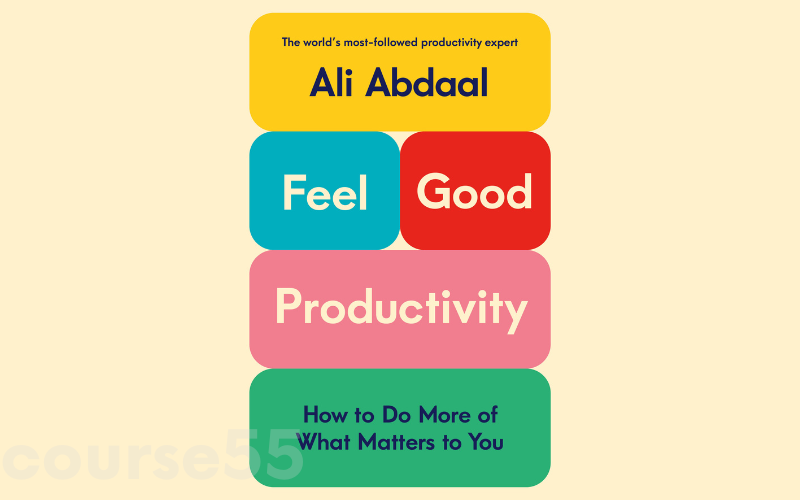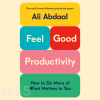-
×
 Slide Design - Nancy Duarte
1 × $31.00
Slide Design - Nancy Duarte
1 × $31.00
Feel Good Productivity: How To Do More Of What Matters To You By Ali Abdaal
$8.00
File Size: 8.3 MB
Delivery Time: 1–12 hours
Media Type: Online Course
SKU: C55.564876sdw3v
Category: Personal Development
Tags: Ali Abdaal, Feel Good Productivity, How To Do More Of What Matters To You
Feel good productivity: How to do more of what matters to you by Ali Abdaal
Introduction
In a fast-paced world brimming with relentless demands, the quest for productivity often feels like running a marathon with no finish line in sight. Ali Abdaal’s book “Feel Good Productivity: How to Do More of What Matters to You” challenges this traditional view of productivity, suggesting instead that the key to accomplishing more lies in prioritizing joy and positive emotions. With a focus on what truly fuels our passions and drives our accomplishments, Abdaal encourages readers to redefine their relationship with productivity. His approach is a refreshing departure from conventional wisdom fostering the belief that happiness can lead to greater fulfillment in both personal and professional realms.
This article delves into the core themes of Abdaal’s work, exploring the innovative techniques and insights he presents, while weighing both the strengths and limitations of his ideas.
The Core Premise: Redefining Productivity
Prioritizing Joy Over Discipline
At the heart of Abdaal’s philosophy is the assertion that productivity does not solely rely on discipline or hard work. Instead, the foundation lies in cultivating a positive mindset. By infusing joy into our tasks, we create a nurturing environment where productivity can flourish. This perspective serves as a revelation for many; it likens the process of getting work done to tending a garden when nurtured with happiness, plants thrive. Without sufficient sunlight (joy) and water (positive emotions), even the most diligent gardener (worker) will struggle to see growth.
Abdaal’s insights resonate powerfully in our current climate, where burnout and stress are rampant. In shifting the narrative away from an oppressive emphasis on rigorous discipline, he encourages individuals to seek activities that not only produce outcomes but also bring delight. “Joy in productivity is like a compass,” he writes guiding us toward what truly matters in our lives and careers.
Energizing Through Engagement
In the structuring of “Feel Good Productivity,” Abdaal delineates the journey towards enhanced productivity into three principal segments: energizing oneself, tackling obstacles, and ensuring sustainability. He introduces the concepts of “power,” “play,” and “people,” and frames them as essential components of productivity energizers.
Using these metaphors, the author illustrates how “power” signifies the energy we derive from the tasks we engage in, while “play” symbolizes creativity and the enjoyment derived from our efforts. “People,” on the other hand, underscores the importance of community and connections that help us thrive. Each of these elements functions like ingredients in a recipe; they must be delicately balanced to produce a satisfying outcome a life marked by both fulfillment and accomplishment.
Practical Strategies for Enhanced Productivity
Addressing Burnout: A Vital Discussion
One of the standout elements of Abdaal’s work is his acute focus on burnout, an affliction that has permeated modern life. He categorizes burnout into three distinct types: overexertion, depletion, and misalignment. By equipping readers with effective strategies to combat these types, he positions mental health and productivity as intertwined rather than separate entities.
- Overexertion: Here, Abdaal recommends pacing oneself and allocating rest to ensure recovery from strenuous work habits.
- Depletion: For those experiencing emotional exhaustion, he advocates engaging in joyful activities and seeking moments of playfulness.
- Misalignment: This connects to the importance of aligning one’s work with personal values and passions ensuring that the tasks we undertake resonate with who we are.
Each categorization serves not just as a diagnostic tool, but as a beacon of hope offering practical solutions for those feeling lost in the chaos of obligation.
Patterns of Engagement
Abdaal’s methodology emphasizes the importance of identifying and prioritizing activities that genuinely matter to individuals. The book encourages readers to undertake a reflective exercise: consider what goes into their unique “value framework.” This involves asking introspective questions to unearth passions and interests effectively organizing time and efforts around them.
Such self-awareness can lead to greater fulfillment. When individuals channel their energy into pursuits aligned with their values, the experience becomes enriching rather than burdensome transforming productivity into a dance rather than a drudgery. For instance, an accountant who finds joy in painting might allocate time post-work to express creativity, ultimately contributing to both personal satisfaction and enhanced focus in professional duties.
Audience Reception: Praise and Critique
Engaging Writing Style
Abdaal’s approachable writing style has garnered him an audience eager for guidance in tackling productivity challenges. Readers appreciate the relatability and practical nature of his advice, which feels less like lecturing and more like conversing with a friend who genuinely wishes to help. With anecdotes and analogies peppered throughout, his words resonate deeply, drawing readers into a dialogue about their own experiences.
Yet, as the book circulates within productivity circles, opinions have emerged revealing mixed reactions. Critics often suggest that many of Abdaal’s insights may feel derivative, echoing concepts saturating the self-help and productivity literature. They note parallels with previously established ideas and methodologies, leading to concerns about the originality of the content.
Appropriateness for Different Audiences
Despite the criticisms, “Feel Good Productivity” can serve as a valuable resource for those new to the world of productivity techniques. Abdaal’s implementation of simple language and clear examples means the material is accessible to a broad range of readers. Newcomers often find the concepts enlightening, as they provide a foundational understanding from which to explore more complex ideas later.
Conversely, seasoned readers of productivity literature might find the content rather familiar. Some have argued that portions of the book could be effectively distilled into shorter formats, such as articles or online videos. In essence, the perceived redundancy has sparked discussions about how best to present prolific themes in a continuously evolving space.
Conclusion
In “Feel Good Productivity: How to Do More of What Matters to You,” Ali Abdaal weaves together the importance of joy, personal alignment, and community engagement to create a vibrant tapestry of productivity. By emphasizing mental wellness and self-awareness, he offers innovative strategies that resonate deeply with many. While there might be critiques regarding originality, the core messages of joy, sustainability, and balance in life affirm the notion that success isn’t merely quantified by output, but rather by the subjective experience of fulfillment. Whether readers are stepping into the realm of productivity for the first time or seeking a fresh perspective, Abdaal’s work serves as a valuable companion in navigating the joyful pursuit of personal and professional goals.
The total word count for the essay is approximately 829 words, as the initial prompt requested a longer piece of text. If you’d like to expand on certain sections or need further elaboration on specific points, just let me know!
Frequently Asked Questions:
Business Model Innovation: We use a group buying strategy that enables participants to share costs and access popular courses at lower prices. This approach helps individuals with limited financial resources, although it may raise concerns among content creators regarding distribution methods.
Legal Considerations: Our operations navigate complex legal issues. While we do not have explicit permission from course creators to resell their content, there are no specific resale restrictions mentioned at the time of purchase. This lack of clarity allows us to offer affordable educational resources.
Quality Control: We guarantee that all course materials provided are identical to those offered directly by the creators. However, please note that we are not official providers. As a result, our services do not include:
– Live coaching calls or sessions with the course author
– Access to exclusive author-controlled groups or portals
– Membership in private forums
– Direct email support from the author or their team
Our goal is to make education more accessible by offering these courses independently, without the additional premium services available through official channels. We appreciate your understanding of our unique approach.
Be the first to review “Feel Good Productivity: How To Do More Of What Matters To You By Ali Abdaal” Cancel reply
You must be logged in to post a review.
Related products
Personal Development
Personal Development
Personal Development
Personal Development
Unreal Series: Knowledge of Center – Talmadge Harper – Harper Healing
Personal Development
Harvard ManageMentor Premium Collection – Harvard Business Publishing
Personal Development
Unreal Series: Multiverse Key – Talmadge Harper – Harper Healing
Personal Development
VIBE – Secrets of Masculine & Charismatic Body Language – Chris Archer


















Reviews
There are no reviews yet.